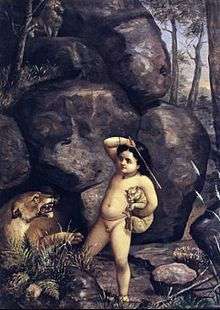Bharata (emperor)
| Bharata | |
|---|---|
| Samrat or Emperor | |
 Bharat plays with lion cubs Painting by Raja Ravi Varma | |
| Predecessor | Dushyanta |
| Successor | Bhumanyu |
| Born |
Saravadamana Sage Kanva hermitage |
| Consort | Sunanda |
| Issue | Bhumanyu |
| Dynasty | Lunar |
| Father | Dushyanta of Hastinapura |
| Mother | Śakuntalā |
In Hindu mythology, Bharata (Sanskrit: भरत, Bharata i.e., "The cherished")[1][2] is a legendary emperor and the founder of the Bhārata dynasty, and thus an ancestor of the Pandavas and the Kauravas in the Sanskrit epic, The Mahabharata. Though the Bhāratas are prominent tribe in the Rigveda,[3] the story of Bharata is first told in the Adi Parva of the Mahabharata, wherein he is the son of Dushyanta and Shakuntala.[4][5] The story of his parents, and his birth, is also related in Kalidasa's famous play, Abhijñānashākuntala.
India has been called Bharatavarṣa (the country of Bharata) after him, and Bhārat is an official name of the Republic of India[4][5]
Etymology
The name Bharata means "the cherished" in Sanskrit. In the Adi Parva (The Book of the Beginning) of the Mahabharata, King Dushyanta was advised by the words:
अभूतिर् एषा कस् त्यज्याज् जीवञ् जीवन्तम् आत्मजम्
शाकुन्तळं महात्मानं दौःषन्तिं भर पौरव
भर्तव्योऽयं त्वया यस्माद् अस्माकं वचनाद् अपि
तस्माद् भवत्व् अयं नाम्ना भरतो नाम ते सुतः
abhūtir eṣā kas tyajyāj jīvañ jīvantam ātmajam
śākuntalaṃ mahātmānaṃ dauḥṣantiṃ bhara paurava
bhartavyo 'yaṃ tvayā yasmād asmākaṃ vacanād api
tasmād bhavatv ayaṃ nāmnā bharato nāma te sutaḥ
Therefore, O thou of Puru's race, cherish thy high-souled son born of (Queen) Sakuntala
and because this child (Bharata) is to be cherished by thee even at our word,
therefore shall this thy son be known by the name of Bharata ("the cherished").
In his childhood, Bharata was known by the name "Sarvadamana" (Sanskrit: सर्वदमनः, Sarvadamanaḥ), meaning "the subduer of all". The dwellers at Sage Kanva's asylum called him by this name because, even in the age of six, he was able to seize and restrain wild animals.
Bharata in Literature
According to the Mahābhārata (Adi Parva), Bharata was the son of King Dushyanta and Shakuntala and thus a descendant of the Lunar dynasty of the Kshatriya Varna. He was originally named Sarvadamana ("the subduer of all"); the Mahābhārata traces the events in his life by which he came to be known as Bharata ("the cherished"). Bharata's exploits as a child prince are dramatised in Kalidasa's poetic play Abhijñānaśākuntalam.
Story of Bharata
Birth
King Dushyanta married Shakuntala on his hunting expeditions in forests, but had to leave for his kingdom. Shakuntala gave birth to his child who was named by the Sage Kanwa named as Sarvadamana. Surrounded only by wild animals, Sarvadamana grew to be a strong child and made a sport of opening the mouths of tigers and lions and counting their teeth.
Time passed on and the King Dushyanta never came back. So, Shakuntala reached King's palace with her son. During the journey, she lost the ring while crossing a river. Arriving at King's court, Shakuntala was hurt and surprised when her husband did not recognize her, nor recollected anything about her. Since she lost the ring, she didn't have any proof as well. A few days later, a fisherman found that ring inside a fish and presented it before the king. After a long course of arguments made by Shakuntala, the King accepted her as his wife. Because King supported his child after hearing the speech of Celestial Messenger, that Shakuntala's son came to be called Bharata ("the cherished", "the supported").
This is however a dramatised version by poet Kalidasa. This varies dramatically from the version in the epic Mahabharata.[6]

In his youth, Bharata became the King. Young Bharata conquered and ruled the entire sub continent of India, from sea to Himalaya. His empire was named Bharatavarsha, the land of Bharata.
Vishnu Purana accounts the extent of Bharatavarsha,
उत्तरं यत्समुद्रस्य हिमाद्रेश्चैव दक्षिणम् ।
वर्षं तद् भारतं नाम भारती यत्र संततिः ।।
uttaraṃ yatsamudrasya himādreścaiva dakṣiṇam
varṣaṃ tadbhārataṃ nāma bhāratī yatra santatiḥ
"The country (varṣam) that lies north of the ocean and south of the snowy mountains is called Bhāratam; there dwell the descendants of Bharata."
He ruled virtuously and earned great fame and was known by the titles of "Chakravarti" (emperor) and "Sarvabhauma" (Sanskrit: सार्वभौमः).
He performed many sacrifices and Sage Kanva was the chief priest at those sacrifices. Bharata had a son named Bhúmanyu. The Mahabharata, in the Adi Parvan, tells two different stories about Bhúmanyu's birth. The first story says that Bharata married Sunanda the daughter of Sarvasena, the King of Kasi Kingdom, and begot upon her the son named Bhumanyu.[7] According to the second story, Bhúmanyu was born out of a great sacrifice that Bharata performed for the sage Bharadwaja.[8]
Bharata lineage
Emperor Bharata gave his name to the dynasty of which he was the founder. It was in the Bharatas' dynasty that, later, the Pandavas of epic Mahabharata were born.
References
- ↑ Mahabharata, Adi Parva, Sambhava Parva
- ↑ Mahabharata, Adi Parva, Sambhava Parva (in Sanskrit)
- ↑ Singh, U. (2009), A History of Ancient and Medieval India: From the Stone Age to the 12th Century, Delhi: Longman, p. 187, ISBN 978-81-317-1677-9
- 1 2 Apte, Vaman Shivaram (1959). "भरतः". Revised and enlarged edition of Prin. V. S. Apte's The practical Sanskrit-English dictionary. Poona: Prasad Prakashan.
- 1 2 Buitenen, J. A. B. van (1973). "Introduction". Mahabharata Book I: The book of beginnings. University of Chicago Press. ISBN 9780226846637.
- ↑ Macfie, J. M (1993). Myths and Legends of India. New Delhi: Rupa & Co. p. 323. ISBN 978-81-7167-131-1.
- ↑ Mahabharata, Adi Parva, Sambhava Parva - Bharata Vamsha in Detail Archived 16 January 2010 at the Wayback Machine
- ↑
External links
- Indian Myth and Legend, CHAPTER IX: Prelude to the Great Bharata War, Sacred Texts.com
| |||||||||||||||||||||
